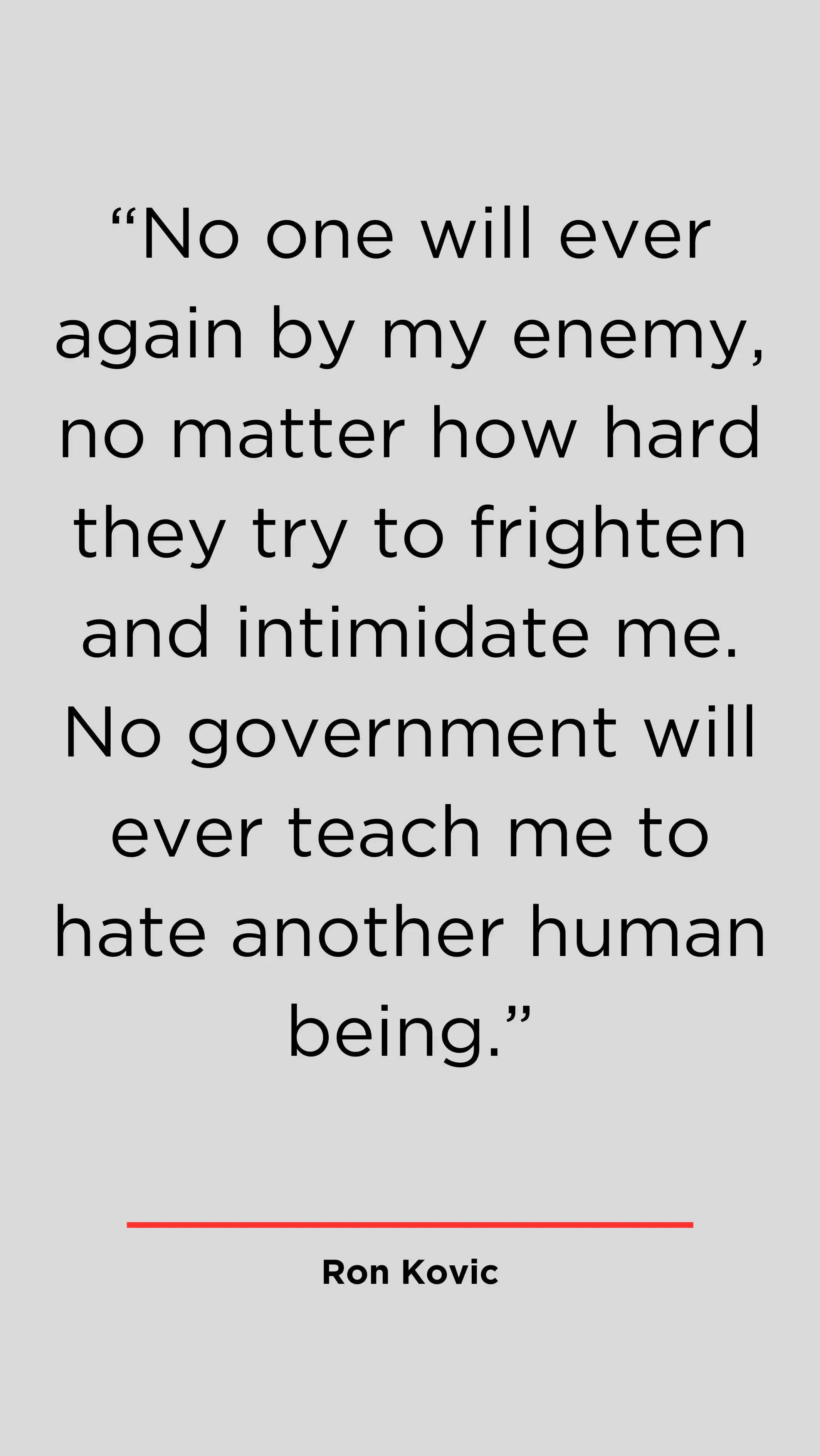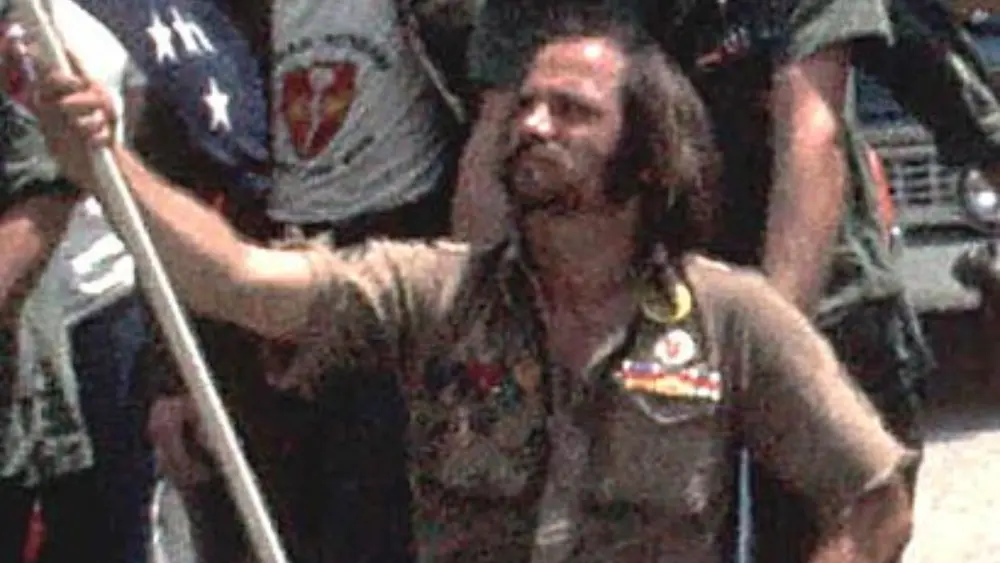Ron Kovic, born July 4, 1946, in Ladysmith, Wisconsin, a resilient Vietnam War Veteran turned activist, shares a powerful narrative. His experiences as a Marine in Vietnam, followed by his outspoken activism against the war, have made a lasting impact on American history.
Early Years and Military Service
Ron Kovic’s early years were characterized by a profound sense of patriotism and a familial legacy of military service. Inspired by his WWII Veteran father, Kovic enlisted in the Marine Corps in 1964, driven by a sense of duty. Kovic’s military enlistment echoed the era’s sentiments, reflecting a commitment to serve during the Vietnam War, driven by patriotism.
Kovic enlisted amid the escalating Vietnam War, his service intertwining with the complex and controversial events of that pivotal era. Unaware then, Kovic’s Marine journey shaped his perspective, becoming central to his later advocacy for peace and Veterans’ rights.
Ron Kovic: Vietnam War and Wounding in Action
In 1965, Kovic’s deployment to Vietnam became a defining moment, with the brutal realities of war leaving a lasting and profound impact on him. In the throes of battle, Kovic endured a catastrophic injury that resulted in his paralysis from the chest down. This life-altering event, which occurred while he was still in his early twenties, not only signified the immense sacrifice made by Kovic in service to his country but also became a pivotal moment that would shape his future trajectory.
The aftermath of his injury marked the beginning of Kovic’s journey toward resilience and advocacy. War’s toll molded him into a passionate advocate for disabled Veterans, emphasizing their rights and well-being and shaping his life’s narrative. Kovic’s battles and advocacy for war’s true costs shaped his later activism, highlighting challenges faced by Veterans in his authorship.
Born on the Fourth of July: Memoir and Movie
Ron Kovic’s poignant and searing memoir, “Born on the Fourth of July,” published in 1976, became a seminal work that illuminated the harsh realities of war and its aftermath. The memoir offered an unfiltered and deeply personal account of Kovic’s experiences in Vietnam, detailing the physical and emotional toll of his catastrophic injury and the challenges he faced upon returning to a country divided by the Vietnam War. Kovic’s narrative was a powerful testament to the human cost of conflict and the profound impact it has on the lives of those who serve.
The widespread acclaim and resonance of Kovic’s memoir prompted its adaptation into a film in 1989, directed by Oliver Stone and starring Tom Cruise as Ron Kovic. The movie, also titled “Born on the Fourth of July,” brought Kovic’s story to a broader audience and further underscored the struggles faced by Veterans returning from war. The film, much like the memoir, received critical acclaim and emphasized the importance of understanding and empathizing with the experiences of those who have sacrificed for their country.
Ron Kovic: Anti-War Activism and Veterans’ Advocacy
Ron Kovic’s personal ordeal in Vietnam fueled a profound transformation, turning him into a prominent anti-war activist. Disillusioned by the harsh realities of war and the toll it exacted on soldiers, Kovic emerged as a powerful voice against U.S. foreign policies. His activism took various forms, including active participation in protests and campaigns that sought to end the Vietnam War. Kovic’s personal narrative of sacrifice and suffering became a compelling tool in his efforts to convey the true human cost of armed conflicts, urging for reevaluating the nation’s approach to war.
In addition to his anti-war activism, Kovic dedicated himself to advocating for the rights of Veterans who, like him, grappled with the enduring physical and psychological scars of war. His efforts focused on highlighting the challenges faced by disabled Veterans and pushing for improved healthcare, social support, and acknowledgment of the sacrifices made by those who served in the military. Kovic’s journey from a wounded Marine to a passionate advocate for peace and Veterans’ rights exemplifies the transformative power of personal experience in shaping a commitment to social justice and humanitarian causes.
March for Veterans’ Rights and Congressional Testimony
In a bold and impactful move, Ron Kovic led a march of disabled Veterans in 1974. This poignant demonstration shed light on the myriad challenges faced by those who returned from Vietnam with physical and psychological injuries. The march served as a public declaration of their demands for improved treatment, support, and recognition of the sacrifices made by Veterans. Kovic’s role as a leader in this march showcased his commitment to amplifying the voices of disabled Veterans, ensuring that their concerns were not overlooked or dismissed.
Kovic’s influence extended beyond the streets to the halls of power when, in 1971. He delivered a powerful testimony before the U.S. Congress. His firsthand account of the struggles and hardships experienced by Vietnam Veterans played a pivotal role in raising awareness about the unique challenges this generation of Veterans encountered upon returning home. Kovic’s testimony contributed significantly to a growing national dialogue on Veterans’ rights and welfare, influencing policy discussions and fostering a greater understanding of the need for comprehensive support systems for those who had served in Vietnam.
Ron Kovic: Impact on Public Perception of Veterans
Ron Kovic’s activism was instrumental in reshaping public perceptions of Vietnam Veterans, challenging stereotypes, and fostering empathy for their struggles. By sharing his personal story and engaging in anti-war protests, Kovic aimed to humanize the experiences of Veterans who had returned from Vietnam. His efforts went beyond political debates, reaching into the hearts and minds of the American public, compelling them to recognize the individual faces and stories behind the broader narrative of the Vietnam War.
Through his memoir, “Born on the Fourth of July,” and other advocacy initiatives, Kovic invited the public to confront the harsh realities faced by Veterans – the physical and psychological toll of war, the challenges of reintegration into civilian life, and the need for comprehensive support systems. In doing so, Kovic played a crucial role in fostering a more nuanced and compassionate understanding of Vietnam Veterans, challenging preconceptions and contributing to a societal shift in recognizing the sacrifices and hardships endured by those who served in this contentious conflict.
Later Years: Continued Activism and Reflection
In the later years of his life, Ron Kovic remained a steadfast advocate for peace, Veterans’ rights, and reconciliation. Furthermore, his unwavering commitment to these causes became even more pronounced as he continued to champion his beliefs. Additionally, Kovic dedicated himself to fostering understanding and dialogue surrounding the lasting effects of war. Notably, he tirelessly worked towards building bridges between different perspectives on conflict and its aftermath. Undeterred by the passage of time, he continued to lend his voice to various movements and initiatives aimed at addressing the broader implications of war and advocating for the well-being of those who had served. Kovic’s activism was not confined to a specific era but extended across decades, demonstrating a lifelong commitment to the principles of justice and compassion.
During this period, Kovic also engaged in reflective writing and public speaking, sharing profound insights into the enduring impact of war on individuals and society as a whole. His reflections underscored the importance of healing and reconciliation, not only for Veterans but also for a nation’s collective consciousness. Kovic’s ability to blend personal experiences with a broader vision for a more peaceful and compassionate world exemplified his enduring dedication to making a positive difference through activism and thoughtful dialogue.

Legacy and Commemoration
Ron Kovic’s legacy is a testament to the transformative power of individual stories in shaping collective understanding. Kovic, through activism, shaped discourse on war consequences, challenging norms, and advocating for Veteran rights, influencing public opinion. “Born on the Fourth of July,” both the memoir and the film adaptation, remains a powerful and poignant narrative. Moreover, it resonates with audiences, offering a compelling window into the complexities of the Vietnam War and its aftermath. Notably, the story provides a profound insight into the challenges faced by Veterans. Additionally, it serves as a thought-provoking reflection on the broader socio-political context of the time. Overall, the dual medium of the memoir and film amplifies the impact of the narrative, fostering a deep and enduring connection with viewers.
Kovic’s legacy endures. He is commemorated for courage and dedication and symbolizes resilience and the relentless pursuit of justice in perpetuity. His work enriches the Vietnam War record and fuels ongoing conversations on conflict’s human cost and societal responsibility to Veterans. Ron Kovic’s legacy inspires reflection, empathy, and a commitment to understanding the lasting effects of war on individuals and communities.












Amazing article dude! Many thanks!